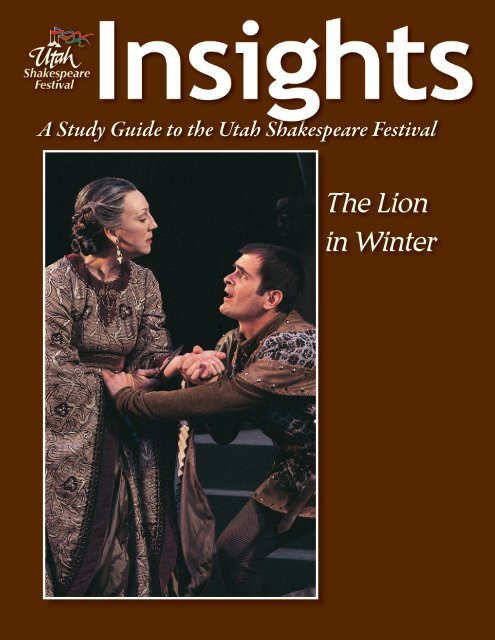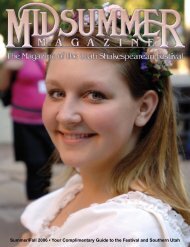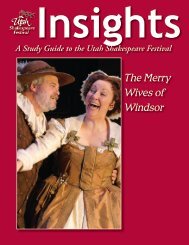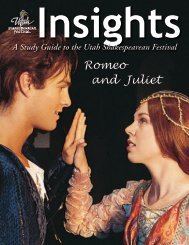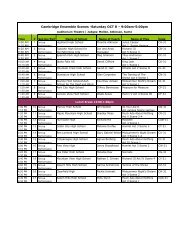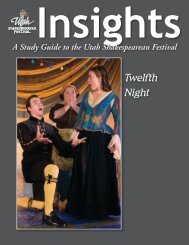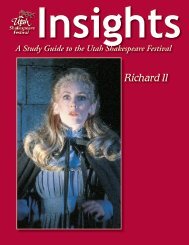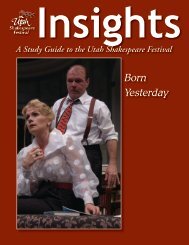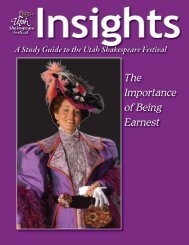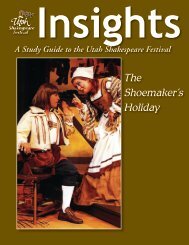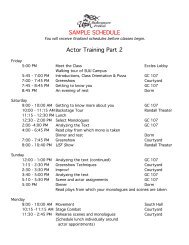The Lion in Winter - Utah Shakespearean Festival
The Lion in Winter - Utah Shakespearean Festival
The Lion in Winter - Utah Shakespearean Festival
You also want an ePaper? Increase the reach of your titles
YUMPU automatically turns print PDFs into web optimized ePapers that Google loves.
A Study Guide to the <strong>Utah</strong> Shakespeare <strong>Festival</strong><br />
<strong>The</strong> <strong>Lion</strong><br />
<strong>in</strong> W<strong>in</strong>ter
<strong>The</strong> articles <strong>in</strong> this study guide are not meant to mirror or <strong>in</strong>terpret any productions at the <strong>Utah</strong> Shakespeare<br />
<strong>Festival</strong>. <strong>The</strong>y are meant, <strong>in</strong>stead, to be an educational jump<strong>in</strong>g-off po<strong>in</strong>t to understand<strong>in</strong>g and enjoy<strong>in</strong>g the plays (<strong>in</strong><br />
any production at any theatre) a bit more thoroughly. <strong>The</strong>refore the stories of the plays and the<br />
<strong>in</strong>terpretative articles (and even characters, at times) may differ dramatically from what is ultimately produced<br />
on the <strong>Festival</strong>’s stages.<br />
Insights is published by the <strong>Utah</strong> Shakespeare <strong>Festival</strong>, 351 West Center Street; Cedar City, UT 84720. Bruce C.<br />
Lee, communications director and editor; Phil Hermansen, art director.<br />
Copyright © 2011, <strong>Utah</strong> Shakespeare <strong>Festival</strong>. Please feel free to download and pr<strong>in</strong>t Insights, as long as you do not<br />
remove any identify<strong>in</strong>g mark of the <strong>Utah</strong> Shakespeare <strong>Festival</strong>.<br />
For more <strong>in</strong>formation about <strong>Festival</strong> education programs:<br />
<strong>Utah</strong> Shakespeare <strong>Festival</strong><br />
351 West Center Street<br />
Cedar City, <strong>Utah</strong> 84720<br />
435-586-7880<br />
www.bard.org.<br />
Cover photo: Leslie Brott (left) and Ty Burrell <strong>in</strong> <strong>The</strong> <strong>Lion</strong> <strong>in</strong> W<strong>in</strong>ter, 1999
<strong>The</strong> <strong>Lion</strong> <strong>in</strong> W<strong>in</strong>ter<br />
Contents<br />
Information on the Play<br />
Synopsis 4<br />
Characters 5<br />
About the Playwright 6<br />
Scholarly Articles on the Play<br />
Is It True? 8<br />
Filial Rebellion 10<br />
<strong>Utah</strong> Shakespeare <strong>Festival</strong><br />
351 West Center Street • Cedar City, <strong>Utah</strong> 84720 • 435-586-7880<br />
3
4<br />
Synopsis: <strong>The</strong> <strong>Lion</strong> <strong>in</strong> W<strong>in</strong>ter<br />
It is Christmas 1183 <strong>in</strong> K<strong>in</strong>g Henry II of England’s palace <strong>in</strong> Ch<strong>in</strong>on, France. Henry is discuss<strong>in</strong>g with<br />
his mistress, Alais, the upcom<strong>in</strong>g day’s events. Henry’s family will be gather<strong>in</strong>g for the holiday—his wife<br />
Eleanor, whom Henry has let out of prison for the occasion, and their three sons, Richard, Geoffrey, and<br />
John. Of course, much of the conversation and thought will center around Henry’s successor to the throne.<br />
Henry makes it clear that he wants the youngest son, John, to be the next k<strong>in</strong>g, while Eleanor wants the<br />
oldest, Richard. Henry has also promised the young Pr<strong>in</strong>ce of France, Philip, that Alais, Philip’s sister, will<br />
marry Richard but he also promises Alais she can rema<strong>in</strong> his mistress.<br />
In another room the three sons are already gib<strong>in</strong>g about who will be k<strong>in</strong>g, soon jo<strong>in</strong>ed by their mother,<br />
and then by Henry and Alais. Henry then turns the discussion to the matter on everyone’s m<strong>in</strong>d: “Well—<br />
what shall we hang? <strong>The</strong> holly or each other?” Richard <strong>in</strong>sists that he become k<strong>in</strong>g because he is the oldest<br />
and the most capable. John is sure he will <strong>in</strong>herit the throne because he is his father’s choice. And Geoffrey,<br />
the middle son, feels unappreciated, with no chance at all of the throne. <strong>The</strong>n the sons and Alais depart,<br />
leav<strong>in</strong>g Henry and Eleanor alone.<br />
Much of the rema<strong>in</strong>der of the play is filled with the duplicitous mach<strong>in</strong>ations of the various members of<br />
the family. At various times Henry courts each son, hop<strong>in</strong>g to advance his agenda through lies and manipulation.<br />
Eleanor does the same. At times it is difficult to tell who wants what and what is the truth.<br />
<strong>The</strong> three sons do the same th<strong>in</strong>g, pair<strong>in</strong>g up with each other <strong>in</strong> various comb<strong>in</strong>ations, hop<strong>in</strong>g to get<br />
the help of the others. John and Geoffrey at one po<strong>in</strong>t even plan a war, with K<strong>in</strong>g Philip’s help, to overthrow<br />
the plans of Richard and Eleanor and take the k<strong>in</strong>gdom from Henry. At another juncture, Henry<br />
<strong>in</strong>sists that Eleanor sign papers giv<strong>in</strong>g the Aquita<strong>in</strong>e, a valuable piece of land <strong>in</strong> France, to John, virtually<br />
guarantee<strong>in</strong>g his ascension to the throne. Eleanor, however, rebuffs his requests, and the two, once aga<strong>in</strong>,<br />
are at a stalemate. At one time, even Geoffrey tries to make an alliance with Philip, <strong>in</strong> his own grab for the<br />
throne.<br />
F<strong>in</strong>ally, Henry concocts one f<strong>in</strong>al scheme. He has his three sons locked <strong>in</strong> the w<strong>in</strong>e cellar and plans to<br />
send Eleanor back to prison. <strong>The</strong>n he will go to Rome, force the pope to annul their wedd<strong>in</strong>g, and marry<br />
Alais.<br />
She can then give him more sons, <strong>in</strong>clud<strong>in</strong>g a new k<strong>in</strong>g. Alais says, however, she can’t marry him if the<br />
sons are left alive and a danger to her <strong>in</strong> the future; but Henry refuses to kill his offspr<strong>in</strong>g. Eleanor takes<br />
daggers to the boys <strong>in</strong> the dungeon, urg<strong>in</strong>g them to run, perhaps kill<strong>in</strong>g their father. However, they can’t act<br />
either, unwill<strong>in</strong>g to harm their father.<br />
In the end, everyth<strong>in</strong>g is as it was <strong>in</strong> the beg<strong>in</strong>n<strong>in</strong>g. Eleanor is headed back to prison, the three pr<strong>in</strong>ces<br />
are still squabbl<strong>in</strong>g over who shall be k<strong>in</strong>g, Alais is caught <strong>in</strong> the middle, and Henry still has no clear successor.<br />
<strong>Utah</strong> Shakespeare <strong>Festival</strong><br />
351 West Center Street • Cedar City, <strong>Utah</strong> 84720 • 435-586-7880
Characters: <strong>The</strong> <strong>Lion</strong> <strong>in</strong> W<strong>in</strong>ter<br />
Henry II: <strong>The</strong> k<strong>in</strong>g of England, Henry is the husband of Eleanor of Aquita<strong>in</strong>e and the father of<br />
Richard, Geoffrey, and John. He also has taken Alais Capet as his mistress. In his fifties, Henry is<br />
near<strong>in</strong>g the years when most men of that age died; however, he still has remarkable vigor and wit,<br />
as well as physical prowess. His clear favorite for his successor is his son, John, but his ma<strong>in</strong> desire<br />
is to keep his k<strong>in</strong>gdom together after his death.<br />
Alais Capet: <strong>The</strong> sister of Philip Capet, Alais is of the royal blood of France and would thus, through<br />
a contracted marriage with Richard, ally the two strong countries of France and England. She was<br />
raised as a child by Eleanor, and is the mistress of Henry. She is no less a pawn <strong>in</strong> the mach<strong>in</strong>ations<br />
of Henry and Eleanor than are their sons.<br />
John: <strong>The</strong> youngest of the three sons of Henry and Eleanor, John is described as pimply and an<br />
immature boy. He is, however, his father’s choice for the crown, and he uses this knowledge <strong>in</strong><br />
taunt<strong>in</strong>g his two brothers.<br />
Geoffrey: <strong>The</strong> middle son of Henry and Eleanor, Geoffrey has no one fight<strong>in</strong>g for his right to any<br />
throne, and he usually accepts his fate, but his does rankle him that he usually is not considered—<strong>in</strong><br />
any matters of the heart or family. He is described as the most cerebral of the three boys.<br />
Richard: <strong>The</strong> oldest of the three sons of Henry and Eleanor, Richard <strong>in</strong> later life becomes known as<br />
Richard the <strong>Lion</strong> Heart. He is his mother’s choice for the next k<strong>in</strong>g, and is probably the best warrior<br />
of the three sons.<br />
Eleanor of Aquita<strong>in</strong>e: <strong>The</strong> wife of Henry II and mother of Richard, Geoffrey, and John, Eleanor is a<br />
strong and powerful woman <strong>in</strong> her own right. She is still beautiful and still <strong>in</strong> many ways <strong>in</strong> love<br />
with her husband, although he keeps her <strong>in</strong> prison most of the time. She is a danger to Henry<br />
because of her strength and <strong>in</strong>telligence; and she champions the fight for Richard to be the next<br />
k<strong>in</strong>g.<br />
Philip Capet: <strong>The</strong> k<strong>in</strong>g of France, Philip is also the brother of Alais. He is young, but has already<br />
become a strong monarch, although no match for Henry. His desire is to marry Alais to Richard<br />
and have Richard crowned k<strong>in</strong>g, thus cement<strong>in</strong>g a relationship between the two countries.<br />
<strong>Utah</strong> Shakespeare <strong>Festival</strong><br />
351 West Center Street • Cedar City, <strong>Utah</strong> 84720 • 435-586-7880<br />
5
6<br />
About the Playwright: James Goldman<br />
By Kelli Frost-Allred<br />
Long before the term “dysfunctional” was commonly applied to families, James Goldman<br />
gave the world a glimpse of this age-old phenomenon by creat<strong>in</strong>g for the stage the members<br />
of England’s orig<strong>in</strong>al Plantaganet family: K<strong>in</strong>g Henry II, Eleanor of Aquita<strong>in</strong>e, and their sons.<br />
Although best known for this play, <strong>The</strong> <strong>Lion</strong> <strong>in</strong> W<strong>in</strong>ter, and the screenplay for the resultant<br />
movie, Goldman was a prolific writer who based many of his novels, plays, and screenplays on history,<br />
a subject he dearly loved.<br />
Goldman’s written corpus is evidence of this fasc<strong>in</strong>ation with history. Russian history studies<br />
led him to write about Tolstoy, Czar Nicholas, and Anna Karen<strong>in</strong>a. But his specialty seems<br />
to have been English history, with twelfth century ruler Henry II as the central character <strong>in</strong> <strong>The</strong><br />
<strong>Lion</strong> <strong>in</strong> W<strong>in</strong>ter, and he used thirteenth-century K<strong>in</strong>g John as the subject of his novel Myself as<br />
Witness and <strong>in</strong> the film Rob<strong>in</strong> and Marian. “I read about the th<strong>in</strong>gs they did, I studied them and<br />
then imag<strong>in</strong>ed what they felt and thought and said and wanted from their lives. What they were<br />
really like, of course, no one will ever know,” wrote James Goldman <strong>in</strong> his preface to <strong>The</strong> <strong>Lion</strong> <strong>in</strong><br />
W<strong>in</strong>ter. In 1980 he wrote, “<strong>The</strong> truth of th<strong>in</strong>gs is always underneath. It has to be imag<strong>in</strong>ed.”<br />
Audience members mustn’t be misled <strong>in</strong>to th<strong>in</strong>k<strong>in</strong>g that <strong>The</strong> <strong>Lion</strong> <strong>in</strong> W<strong>in</strong>ter is a drama.<br />
“He understood what comedy was about,” said his agent and wife of twenty-seven years, Barbara<br />
Goldman, <strong>in</strong> an <strong>in</strong>terview with the <strong>Utah</strong> Shakespeare <strong>Festival</strong>. “<strong>The</strong> <strong>Lion</strong> <strong>in</strong> W<strong>in</strong>ter could have<br />
been a tragedy as easily as a comedy. And it has to do with his po<strong>in</strong>t of view of the world. He<br />
viewed himself as a comedic writer. I th<strong>in</strong>k his sense of humor was everyth<strong>in</strong>g about him.”<br />
“Does it matter what comes after us?” Eleanor asked <strong>in</strong> the play. It mattered terribly to<br />
Eleanor, but not to James Goldman. His outlook on life prevented him from worry<strong>in</strong>g enough<br />
about such mortal trivia to bother answer<strong>in</strong>g his own question. And while K<strong>in</strong>g Henry may have<br />
said “My life, when it is written, will read better than it lived,” the man who <strong>in</strong>vented these words<br />
for Henry did not share his zeitgeist.<br />
“Jim was not a man who would have taken someth<strong>in</strong>g and been pompous about it,” Mrs.<br />
Goldman said. His Oscar sits “somewhere on a bookshelf ” <strong>in</strong> the Goldman home.<br />
Goldman wrote every day, seven days a week. “He did not write on a computer; he would<br />
only write us<strong>in</strong>g an IBM Selectric— you know, the k<strong>in</strong>d with the golf ball,” Mrs. Goldman attested.<br />
“Jim called his typewriter ‘Big Jack’ <strong>in</strong> honor of his favorite golfer, Jack Nicklaus.”<br />
James Goldman was born <strong>in</strong> Chicago on June 30, 1927. Four years later, his brother William<br />
(author and screenwriter of <strong>The</strong> Pr<strong>in</strong>cess Bride) was born <strong>in</strong>to the family. <strong>The</strong> two brothers would<br />
rema<strong>in</strong> close, and eventually both became writers. In fact, the two wrote collaboratively for film,<br />
television, and theatre (A Family Affair, Stanley Poole). Both received Academy Awards for their<br />
screenwrit<strong>in</strong>g, but at separate times for separate films: James won for <strong>The</strong> <strong>Lion</strong> <strong>in</strong> W<strong>in</strong>ter (1969)<br />
while William won for Butch Cassidy and the Sundance Kid (1970) and All the President’s Men<br />
(1977). James collaborated with Stephen Sondheim on Even<strong>in</strong>g Primrose (1966) and on Follies<br />
(1971). Goldman began writ<strong>in</strong>g Follies <strong>in</strong> 1965 as a murder mystery, but eventually took it to<br />
Broadway and won the New York Drama Critics Circle Award for Best Musical (1971). <strong>The</strong> 1987<br />
London revival of Follies garnered the Olivier Award for the year’s best musical.<br />
After earn<strong>in</strong>g an undergraduate degree from the University of Chicago, Goldman was drafted<br />
and served <strong>in</strong> the U.S. Army. He later attended Columbia University <strong>in</strong> New York City, where he<br />
studied musicology, but eventually decided that writ<strong>in</strong>g would be his career. He married Barbara<br />
Goldman, a producer, <strong>in</strong> 1971. A very private family, the Goldmans seldom socialized with<br />
bus<strong>in</strong>ess associates <strong>in</strong> the enterta<strong>in</strong>ment field, <strong>in</strong> spite of the fact that James worked with such<br />
<strong>Utah</strong> Shakespeare <strong>Festival</strong><br />
351 West Center Street • Cedar City, <strong>Utah</strong> 84720 • 435-586-7880
Broadway heavyweights as Emanuel “Manny” Azenberg, Harold Pr<strong>in</strong>ce, and Stephen Sondheim.<br />
Hollywood has transformed many theatre scripts <strong>in</strong>to huge film successes, and although <strong>The</strong> <strong>Lion</strong><br />
<strong>in</strong> W<strong>in</strong>ter is among those plays, it rema<strong>in</strong>s a classic of modern theatre as well. Goldman wrote that<br />
“<strong>The</strong> <strong>Lion</strong> <strong>in</strong> W<strong>in</strong>ter was more than reprieved by the movie. It was transformed <strong>in</strong>to a theatre work<br />
that has been performed all over the world.” <strong>The</strong> orig<strong>in</strong>al stage cast <strong>in</strong>cluded Robert Preston as Henry<br />
II, Rosemary Harris as Eleanor of Aquita<strong>in</strong>e, and Christopher Walken as France’s Philip Capet. <strong>The</strong><br />
film version of <strong>The</strong> <strong>Lion</strong> <strong>in</strong> W<strong>in</strong>ter marked milestones <strong>in</strong> several careers: Goldman’s first and only<br />
Academy Award (for his screenplay adaptation) as well as a Golden Globe nom<strong>in</strong>ation; Kathar<strong>in</strong>e<br />
Hepburn’s third of four best actress Oscars; an Oscar nom<strong>in</strong>ation and Golden Globe Award for<br />
Peter O’Toole (best actor); the New York Film Critics Circle Award for Best Film of 1968; Anthony<br />
Hopk<strong>in</strong>s’s film debut play<strong>in</strong>g Henry’s son, Pr<strong>in</strong>ce Richard; and Timothy Dalton’s film debut as Pr<strong>in</strong>ce<br />
Philip.<br />
Goldman dist<strong>in</strong>guished himself as a writer <strong>in</strong> several genres, <strong>in</strong>clud<strong>in</strong>g novels (Myself as Witness,<br />
Waldorf, <strong>The</strong> Man from Greek and Roman, Fulton County), short stories (White Nights), theatre<br />
(<strong>The</strong> <strong>Lion</strong> <strong>in</strong> W<strong>in</strong>ter; <strong>The</strong>y Might Be Giants; Blood,Sweat, and Stanley Poole), television (Anastasia:<br />
<strong>The</strong> Mystery of Anna), film (<strong>The</strong> <strong>Lion</strong> <strong>in</strong> W<strong>in</strong>ter, Nicholas and Alexandra, Rob<strong>in</strong> and Marian, White<br />
Nights), and musical theater (Follies, Even<strong>in</strong>g Primrose). At the time of his death, Goldman had just<br />
completed the script for a musical based on the novel Tom Jones, which is currently be<strong>in</strong>g planned for<br />
production.<br />
Through the voice of an ag<strong>in</strong>g queen, Eleanor of Aquita<strong>in</strong>e, Goldman asks: “For the love of God,<br />
can’t we love one another just a little? That’s how peace beg<strong>in</strong>s. We have so much to love each other<br />
for. We have such possibilities, my children; we could change the world.”<br />
James Goldman died unexpectedly on October 28, 1998, after suffer<strong>in</strong>g a heart attack. Goldman<br />
did not leave us with an account of his life. <strong>The</strong> narrative that was his life has yet to be told, but his<br />
legacy is left to us <strong>in</strong> words. “<strong>The</strong> <strong>Lion</strong> <strong>in</strong> W<strong>in</strong>ter has relevance today. This is why we’re do<strong>in</strong>g it<br />
<strong>in</strong> New York this year, for the first time s<strong>in</strong>ce the orig<strong>in</strong>al production <strong>in</strong> 1966,” said Mrs. Goldman<br />
proudly.<br />
<strong>Utah</strong> Shakespeare <strong>Festival</strong><br />
351 West Center Street • Cedar City, <strong>Utah</strong> 84720 • 435-586-7880<br />
7
8<br />
Is It True?<br />
By Ace Pilk<strong>in</strong>gton<br />
From Midsummer Magaz<strong>in</strong>e, 1999<br />
“Is it true?” That’s one of the first questions audience members ask about a historical play such as <strong>The</strong><br />
<strong>Lion</strong> <strong>in</strong> W<strong>in</strong>ter, <strong>The</strong> answer, of course, is, “yes, no, and maybe.”<br />
James Goldman said, “This play, while simplify<strong>in</strong>g the political maneuver<strong>in</strong>g--and comb<strong>in</strong><strong>in</strong>g a meet<strong>in</strong>g<br />
of the French and English K<strong>in</strong>gs <strong>in</strong> 1183 with a Royal Court held at W<strong>in</strong>dsor the follow<strong>in</strong>g year <strong>in</strong>to<br />
a Christmas Court that never was--is based on available data” (<strong>The</strong> <strong>Lion</strong> <strong>in</strong> W<strong>in</strong>ter [New York: Pengu<strong>in</strong><br />
Books, 1983], ix). He admits that he got John wrong, that his dissatisfaction is rather like “what biographers<br />
must feel at hav<strong>in</strong>g missed the . . . essence of their subject” (vi). For the others, he feels he has reached<br />
that essence, argu<strong>in</strong>g that the depths of fiction are often more reveal<strong>in</strong>g than surface facts: “<strong>The</strong> truth of<br />
th<strong>in</strong>gs is always underneath. It has to be imag<strong>in</strong>ed” (vii).<br />
<strong>The</strong> big picture Goldman pa<strong>in</strong>ts of a family at war with itself and its neighbors is not <strong>in</strong> doubt. <strong>The</strong><br />
constant fight was as much a family heritage as the lands about which they fought. <strong>The</strong> Angev<strong>in</strong>s (from<br />
Anjou their ancestral prov<strong>in</strong>ce; Plantagenet, a popular nickname centuries later, refers to early family members<br />
who stuck sprigs of broom <strong>in</strong> their caps) were a superbly capable, astonish<strong>in</strong>gly irascible bunch. <strong>The</strong>y<br />
believed they were descended from the devil, and most people who got <strong>in</strong> their way agreed. Henry II’s sons<br />
repeated what Abb, Bernard said about their father as an <strong>in</strong>fant, “‘From the devil he came; to the devil<br />
he will go”’ (Amy Kelly, Eleanor ofAquita<strong>in</strong>e and the Four K<strong>in</strong>gs [Cambridge, Massachusetts: Harvard<br />
University Press, 1950], 170).<br />
Henry II’s father, Count Geoffrey of Anjou (Henry also had a brother and a son named Geoffrey.),<br />
f<strong>in</strong>d<strong>in</strong>g himself <strong>in</strong> a dispute about whether he or the canons of the bishopric of Seez should select the<br />
next bishop, had the canons and their bishop-elect castrated (Alfred Duggan, Devilr Brood [New York:<br />
Coward-McCann, Inc., 1957], 10). Follow<strong>in</strong>g her divorce from K<strong>in</strong>g Louis VII of France, Eleanor, who<br />
probably already had an understand<strong>in</strong>g with Henry, was ambushed by “Geoffrey of Anjou (aged sixteen),<br />
the enterpris<strong>in</strong>g younger brother of Henry who.. . plotted brigand-wise to possess himself of her person and<br />
her fiefs” (Kelly 80). Eleanor’s escort defeated him, but he was a faithful harb<strong>in</strong>ger of the family feuds to<br />
come. Such squabbles were, as Goldman shows, cont<strong>in</strong>ued <strong>in</strong> the next genera-tion. Henry barely survived<br />
the revolt by his wife and sons for which he imprisoned Eleanor, but as Philip Warner says, his “personal<br />
troubles were not over, and never would be. When not jealous of their father, his restless sons were jealous<br />
of each other” (Sieges of the Middle Ages [New York: Barnes & Noble Books, 1968], 116).<br />
<strong>The</strong> <strong>Lion</strong> <strong>in</strong> W<strong>in</strong>ter’s portrait of these family rivalries is essentially cor-rect. Goldman has Richard say,<br />
“I’m not a second son. Not now. Your Henry’s <strong>in</strong> the vault, you know” (49).<br />
“Of all his sons Henry loved this eldest one [who died before the open<strong>in</strong>g of the play] with special<br />
predilection” (Kelly 171), and Richard was pa<strong>in</strong>fully jealous. With the death of young Henry John became<br />
his father’s favorite (Richard Barber, <strong>The</strong> Devil’s Crown [Pennsylvania: Comb<strong>in</strong>ed Books, 1997], 67), and<br />
Richard had yet more to resent. Part of the trouble between Henry and Richard was, as Goldman shows,<br />
that Eleanor preferred Richard (Kelly 173).<br />
Goldman’s characterizations are also basically accurate. Richard was as ruthless and Geoffrey as deceptive<br />
as the play suggests. Richard, <strong>in</strong> Amy Kelly’s words, “took the fortresses of his enemies, razed their<br />
castles, burned their towns, uprooted their orchards and v<strong>in</strong>eyards, sowed their fields with salt, ordered the<br />
hands of his captives cut off and their eyes gouged out, and dishonored the women of his hostages with a<br />
very sovereign severity” (195). And Geoffrey was even more brilliantly devious <strong>in</strong> real life than he is <strong>in</strong> the<br />
play, with, Kelly says, “an extraord<strong>in</strong>ary <strong>in</strong>genuity <strong>in</strong> <strong>in</strong>trigue and a persuasiveness that few could resist even<br />
when they knew they could not rely upon his plans or promises.” She cont<strong>in</strong>ues with what might almost be<br />
a summary of one of Goldman’s scenes: “Confronted with his own crookedness, he was shameless, crafty,<br />
full of excuses” (174).<br />
<strong>Utah</strong> Shakespeare <strong>Festival</strong><br />
351 West Center Street • Cedar City, <strong>Utah</strong> 84720 • 435-586-7880
Goldman’s Eleanor and Henry are also much like their historical orig<strong>in</strong>als. Eleanor herself was brilliant,<br />
charm<strong>in</strong>g, much concerned with grow<strong>in</strong>g old (Marion Meade, Eleanor of Aquita<strong>in</strong>e: A Biography [New<br />
York: Hawthorn Books, Inc., 1977], 247), and an enor-mously troublesome wife. Her first husband, Louis<br />
VII, when he and Eleanor were on crusade and she demanded a divorce, also found it necessary to hold her<br />
captive (Kelly 60-2), and Henry considered a variety of options for deal<strong>in</strong>g with her, <strong>in</strong>clud<strong>in</strong>g divorc<strong>in</strong>g<br />
her and then imprison<strong>in</strong>g her <strong>in</strong> a nunnery (Kelly 190). Henry had most of the good and bad traits of the<br />
Angev<strong>in</strong>s: ferocious energy, a fierce temper, an appetite for mistresses, and impatience with the powerful<br />
(Warner 116). He also had other qualities<br />
Goldman claims for him, a preference for peace over war and a genius for mak<strong>in</strong>g just laws and good<br />
government (Kelly 203-04). However, not all of Goldman’s materials are equally reliable. <strong>The</strong> rumor that<br />
Eleanor had had a sexual relationship with Henry II’s father, Count Geoffrey the Handsome (so called<br />
for his appearance, not his behavior), is probably untrue (Desmond Seward, Eleanor of Aquita<strong>in</strong>e: <strong>The</strong><br />
Mother Queen [New York: Dorset Press, 1978], 60). Much more likely is the affair between Alais and<br />
Henry and Henry’s plan to start a new family while dis<strong>in</strong>herit<strong>in</strong>g the old one (Kelly 192-3). Perhaps the<br />
most mislead<strong>in</strong>g use of rumor <strong>in</strong> the play is the suggestion that Philip and Richard had a homosexual relationship.<br />
Both Anthony Bridge (Richard the <strong>Lion</strong>heart [New York: M. Evans & Company, Inc., 1989],<br />
141) and John Gill<strong>in</strong>gham (Richard the <strong>Lion</strong>heart [New York: Times Books, 1978], 161-2) cite rumors<br />
that suggest Richard was an extremely active heterosexual. Perhaps a more serious issue than choos<strong>in</strong>g<br />
which rumors to believe is what Goldman calls “simplify<strong>in</strong>g the political maneuver<strong>in</strong>g.” He has deliberately<br />
distorted Henry Ifs goals for and attitudes about his empire. In all probability, he was not try<strong>in</strong>g to<br />
secure the crown of England for John but to put Richard <strong>in</strong> the position of eldest son follow<strong>in</strong>g young<br />
Henry’s death. S<strong>in</strong>ce Richard was now to receive his father’s lands of England and Normandy, his mother’s<br />
property—Aquita<strong>in</strong>e— should go to John, who, at that po<strong>in</strong>t, had noth<strong>in</strong>g. Richard was distrustful and<br />
under-standably reluctant to trade actual rule of “the richest prov<strong>in</strong>ce on the Cont<strong>in</strong>ent” (Goldman 43),<br />
where he felt at home, for a promise of power <strong>in</strong> the alien north. Henry’s policy of try<strong>in</strong>g to give each of his<br />
three sons someth<strong>in</strong>g while simultaneously try<strong>in</strong>g to deprive the most warlike and dangerous of them of his<br />
power base makes excellent sense, as does Richard’s-resistance (Richard Barber, Henry Plantagenet, 1133-<br />
1189 [New York: Barnes & Noble Books, 1964], 212-13).<br />
Ultimately, though, all plays, historical or not, must be judged not accord<strong>in</strong>g to how accurately they<br />
have employed facts but how profoundly they have explored truths. In her direc-or’s notes, Kathleen E<br />
Conl<strong>in</strong> says, <strong>The</strong> <strong>Lion</strong> <strong>in</strong> W<strong>in</strong>ter is “about the demo-tion of royalty <strong>in</strong>to the messy, psychological passions<br />
of human frailties and human families.” Goldman has his Henry tell us that he has much <strong>in</strong> common with<br />
K<strong>in</strong>g Lear, another k<strong>in</strong>g demoted to the status of troubled father. However, <strong>in</strong> the end these plays about<br />
families must also be capable of rais<strong>in</strong>g their characters to transcendent heights—beyond the vicissitudes of<br />
family and royalty to central truths about humanity. Shakespeare’s K<strong>in</strong>g Lear, of course, does so. Has James<br />
Goldman also succeeded? That is a question, not for a historian, but for a theatre audience.<br />
<strong>Utah</strong> Shakespeare <strong>Festival</strong><br />
351 West Center Street • Cedar City, <strong>Utah</strong> 84720 • 435-586-7880<br />
9
10<br />
Filial Rebellion<br />
By Heidi Madsen<br />
“Henry . . . had that goodly household, valiant, wise, and prudent; father of the young k<strong>in</strong>g who<br />
jousted with such ardor; father of Richard the cunn<strong>in</strong>g, who was so wise and shrewd: father of Geoffrey of<br />
Brittany, who likewise was a man of great deeds; and father of John Lackland, because of whom he suffered<br />
much strife and warfare” (Ambrose, L’Estoire de le guerre sa<strong>in</strong>te, cited <strong>in</strong> Amy Kelly, Eleanor of Aquita<strong>in</strong>e<br />
and the Four K<strong>in</strong>gs [Cambridge, Massachusetts: Harvard University Press, 1950], 170).<br />
In James Goldman’s play, <strong>The</strong> <strong>Lion</strong> <strong>in</strong> W<strong>in</strong>ter, it is w<strong>in</strong>ter, 1183; cold implications of an approach<strong>in</strong>g<br />
holiday permeate the air <strong>in</strong> an arguably uncivilized world. Henry II and his wife, Eleanor, are fight<strong>in</strong>g<br />
over which of their three sons should be the next k<strong>in</strong>g: Eleanor wants Richard, Henry wants John, and no<br />
one wants Geoffrey. All three of Henry’s sons either already have or soon will rebel aga<strong>in</strong>st him. Eleanor<br />
has been rebellious too, a crime for which her unforgiv<strong>in</strong>g husband keeps her bricked <strong>in</strong> (that is unless he<br />
needs her diplomatic skills), but she is to be liberated for a Christmas celebration <strong>in</strong> France at the palace of<br />
Ch<strong>in</strong>on.<br />
Peter O’Toole called <strong>The</strong> <strong>Lion</strong> <strong>in</strong> W<strong>in</strong>ter “a witty, literate, modern appreciation of the <strong>in</strong>trigues and<br />
bitchery between Henry II, his wife, Eleanor of Aquita<strong>in</strong>e, and their three sons” (Nicholas Wapshott, Peter<br />
O’Toole [Sevenoaks, Kent: New English Library, 1983], 145), but it is much more. This is a play about<br />
power and control, and it is also a play about family. Henry II needed an “heir to all the k<strong>in</strong>g’s own striv<strong>in</strong>g<br />
and contriv<strong>in</strong>g” (Kelly 171). Children are extensions of their parents, and perhaps this is an assurance<br />
of cont<strong>in</strong>uation; hold<strong>in</strong>g on to the world is <strong>in</strong> this way possible. Soon, however, grow<strong>in</strong>g limbs, grow<strong>in</strong>g<br />
mentalities--<strong>in</strong>dividual ideas and thoughts--extend dist<strong>in</strong>ctly gnarled f<strong>in</strong>gers out <strong>in</strong>to society. Henry probably<br />
could never have anticipated the contention and strife his sons would eventually <strong>in</strong>itiate; but were they<br />
somehow connected to the fact that the boys were his royal-blooded sons?<br />
<strong>The</strong> <strong>Lion</strong> <strong>in</strong> W<strong>in</strong>ter is a play about a royal family tree, its roots <strong>in</strong> all of England and three quarters<br />
of France. Henry’s large doma<strong>in</strong>s were called the Angev<strong>in</strong> empire, s<strong>in</strong>ce the family’s orig<strong>in</strong>al hold<strong>in</strong>g was<br />
the French prov<strong>in</strong>ce of Anjou. Legend, however, would have us believe that their <strong>in</strong>heritance amounted<br />
to more than property: “<strong>The</strong> Counts of Anjou were descended from the Devil, which went some way to<br />
expla<strong>in</strong> their ferocious behavior” (Alfred Duggan, Devil’s Brood [New York: Coward-McCann, Inc., 1957],<br />
ix). Could such a l<strong>in</strong>eage perhaps even condone a somewhat <strong>in</strong>voluntary rapaciousness?<br />
Goldman professed to know the non-fictitious faults of Henry II, Eleanor, and their contumacious sons<br />
(of course, he is more than familiar with those charismatic blemishes of character he himself imag<strong>in</strong>atively<br />
appended); but he loves them regardless (<strong>The</strong> <strong>Lion</strong> <strong>in</strong> W<strong>in</strong>ter [New York: Pengu<strong>in</strong> Books, 1983], vii).<br />
This apparent passion allows one to sit back, fear<strong>in</strong>g noth<strong>in</strong>g, and become <strong>in</strong>timately acqua<strong>in</strong>ted with the<br />
characters, confident <strong>in</strong> Goldman’s astound<strong>in</strong>g loyalty.<br />
How easy would it be to write a play about the real Angev<strong>in</strong>s? Historically, Henry II was “short and<br />
sandy-haired . . . notoriously lecherous” (Duggan 37), a man who supposedly once ate his bedd<strong>in</strong>g <strong>in</strong> a fit<br />
of temper (Duggan 38-39). Richard the <strong>Lion</strong>-Heart has been documented as a “brave, cultivated but cruel<br />
and tempestuous man, dogged by ill-health” ( John Cannon and Ralph Griffiths, <strong>The</strong> Oxford Illustrated<br />
History of the British Monarchy [Oxford: Oxford University Press 1988, repr<strong>in</strong>ted with corrections 1997],<br />
159). However, Goldman’s Richard seems almost naïve—childlike—<strong>in</strong> conversation with his mother, and<br />
with his (supposed) lover, Philip II of France. (<strong>The</strong> fictional Richard may be more worthy of sympathy.)<br />
Geoffrey perhaps was neglected, overlooked, underestimated <strong>in</strong> medieval reality as well as <strong>in</strong> <strong>The</strong> <strong>Lion</strong><br />
<strong>in</strong> W<strong>in</strong>ter. He was not given the same opportunity as his brothers; made duke of Brittany, he was not even<br />
considered for the crown. Nevertheless, he may have been, second only to Eleanor herself, the most <strong>in</strong>sidious<br />
and the most <strong>in</strong>tellectual, <strong>in</strong>fect<strong>in</strong>g everyone with his schemes and ideas on the sly. (Though Cicero<br />
would assure us that trickery and <strong>in</strong>telligence are ‘’entirely different and remote from one another’’ (Cicero,<br />
Selected Works, translated by Michael Grant [Harmondsworth, Middlesex, England: Pengu<strong>in</strong> Books 1960,<br />
<strong>Utah</strong> Shakespeare <strong>Festival</strong><br />
351 West Center Street • Cedar City, <strong>Utah</strong> 84720 • 435-586-7880
epr<strong>in</strong>ted with revisions 1967], 185). Still, Goldman shows him to be always th<strong>in</strong>k<strong>in</strong>g, “humm<strong>in</strong>g treachery”<br />
( 8), until he seems almost <strong>in</strong>human. “He isn’t flesh: he’s a device; he’s wheels and gears” (Goldman<br />
84). Oddly, however, there is a sensitivity dist<strong>in</strong>guishable <strong>in</strong> Geoffrey—a sore spot for a lifelong memory of<br />
the <strong>in</strong>difference between his parents.<br />
<strong>The</strong> youngest, the most susceptible to Geoffrey’s mach<strong>in</strong>ations, is the romantically <strong>in</strong>famous Pr<strong>in</strong>ce<br />
John. A villa<strong>in</strong> we love to hate <strong>in</strong> other stories, <strong>in</strong> <strong>The</strong> <strong>Lion</strong> <strong>in</strong> W<strong>in</strong>ter, he represents what can only be<br />
described as unattractive and thoroughly undesired. A hunched and pitiful jester, as far from courage as he<br />
is from comel<strong>in</strong>ess, with a whim, much like the motivation beh<strong>in</strong>d a child’s tantrum, for his father’s acceptance<br />
and his crown. <strong>The</strong>se royal brothers may all suffer side effects from a childhood void of all sentiment;<br />
though all are of an entirely separate psychological variety. Still they are united <strong>in</strong> the one desire that most<br />
completely divides them—an <strong>in</strong>herited lust for the crown, which they would peck and claw to obta<strong>in</strong>.<br />
Henry said, “Thus will they pursue me till I die” (Kelly 170). All of these faults, yet still they are thought of<br />
fondly?<br />
Also participants <strong>in</strong> the holiday <strong>in</strong>trigue are two outside the family: K<strong>in</strong>g Philip and his older sister<br />
Alais, an adopted pawn taken <strong>in</strong> by Henry sixteen years earlier. (How was Henry to know she would grow<br />
up to be so appeal<strong>in</strong>g?) Intended for Richard, promised to John, and loved by her k<strong>in</strong>g, Alais is caught <strong>in</strong><br />
a bizarre triangle of potential husbands, though deriv<strong>in</strong>g no pity from an unemotionally <strong>in</strong>volved brother.<br />
Among these players, ever shift<strong>in</strong>g islands of alliances form, and, as the tide, loyalties rema<strong>in</strong> elusive. <strong>The</strong><br />
brilliant wit and bit<strong>in</strong>g sarcasm that all the characters possess enhance the twilight trysts and assure the<br />
eventual exposure of every secret contrivance.<br />
“What shall we hang? the holly or each other?” Henry asks (15). Mercy could very likely be the answer<br />
that this Christmas play gives. Henry can neither keep his sons imprisoned nor have them executed, and<br />
they, <strong>in</strong> turn, cannot kill him. Is it accidental that the candles Henry steals (and the light on this f<strong>in</strong>al<br />
scene) belong to Jesus—who won’t begrudge them? Henry must give up much of what he wants, has to live<br />
with disappo<strong>in</strong>tment, and, as everyone else <strong>in</strong> the story must also do, even condone betrayal. It is not the<br />
end, however; forgiveness is. Noth<strong>in</strong>g is f<strong>in</strong>ally ga<strong>in</strong>ed or completely lost; with<strong>in</strong> the family, there is always<br />
another beg<strong>in</strong>n<strong>in</strong>g.<br />
<strong>Utah</strong> Shakespeare <strong>Festival</strong><br />
351 West Center Street • Cedar City, <strong>Utah</strong> 84720 • 435-586-7880<br />
11


